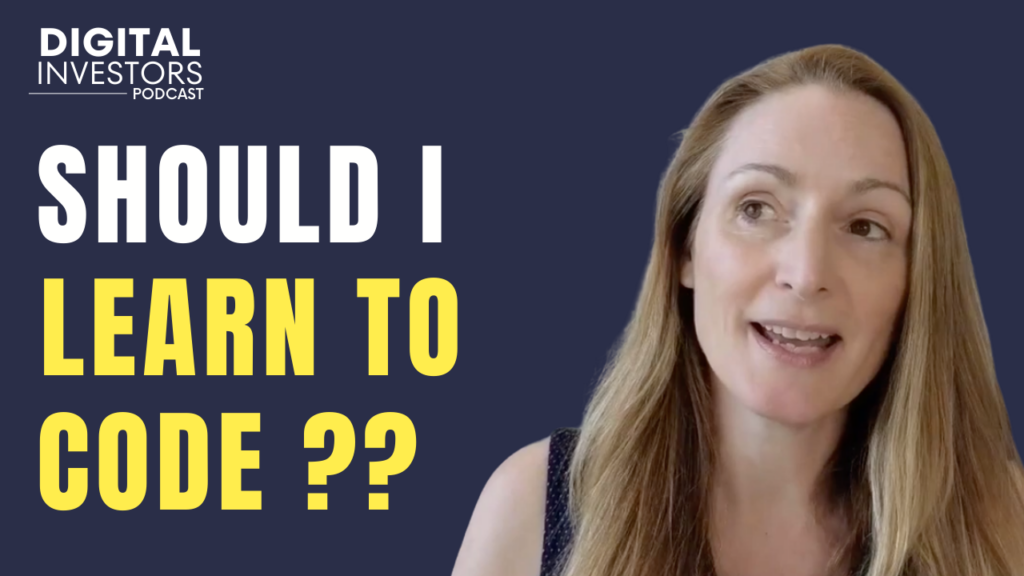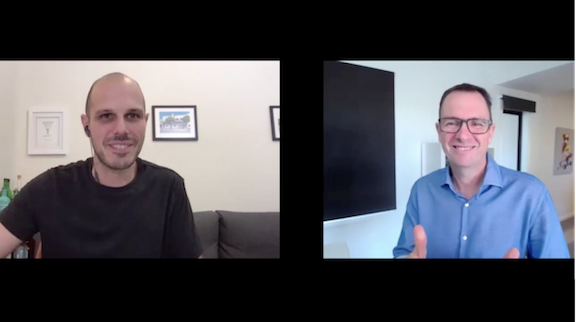Have you always believed that learning to code is unnecessary?
At eBusiness Institute, we’re actually very much, “No, you don’t need to learn to code.”
Everything we teach is either no code or very low code ways of generating income and building assets online.
But I became interested in it because our daughter was very interested in coding.
So I started researching and getting in-depth about coding.
In this eye-opening video, I’ll share extensive research and findings so you can see if learning how to code is a skill you need to succeed online, especially in this fast-moving digital age of AI.
Hi, it’s Liz Raad with you today, and I want to share something a bit different on this episode. I want to answer a question we are often asked: “Should I learn to code, especially in this age of artificial intelligence and this fast-moving digital age?”
That’s a really great question, and it’s one I personally started researching. I became interested in it because our daughter was very interested in coding. She loves it! And so I was researching and getting in-depth about what’s happened in this space. What can you do with code? What are the advantages of learning to code?
Previously, especially with our organisation here at eBusiness Institute, we’re actually very much, “No, you don’t need to learn to code.” And everything we teach is either no code or very low code ways of generating income and building assets online.
But I wanted to keep an open mind and look into the advantages of learning to code. Also, what are some disadvantages? Why would you not learn to code in this time and place?
So let’s get into it. I want to give you three reasons why learning to code is a great idea and three reasons why it might not be a good idea for you because this is all about your journey and where you want to get to.
3 Reasons why you should learn to code
So, let’s start with why you should perhaps learn to code.
Reason #1 – Learning to code develops a better understanding of what you need to ask your tech team.
The first one is that learning to code is about understanding. I became interested in this because I had never learned deep coding. I know some HTML and some CSS and the basics of building websites using WordPress. But I didn’t know much beyond that.
And so, I became interested as I watched my daughter get in and program apps and do all this cool stuff with code. I wanted to understand this world we lived in because code is everywhere now. It runs our lives. It’s in every business, it’s in every home, it’s in appliances, it’s in your computer, and it’s in your phone. It’s everywhere, so we can’t escape coded things.
“There is a huge marketplace for people who understand and can code.” – Liz Raad, eBusiness Institute
So I wanted to understand this marketplace.
From a business and entrepreneurial point of view, if I want to create something, I need to understand what I’m asking my tech people to do.
I think there are a lot of misunderstandings and tension when an entrepreneur wants to achieve something. They want to program something, or they want to build an app, or they want to create a new website, etc. But they don’t understand the technicalities of what they’re asking a coder to do.
One thing I’ve noticed in my journey is if I ask most coders, “Hey, can we do this?” They will say yes because they can. But that doesn’t really answer my question. The smarter question would be, “How hard is it to do this? Or is this a standard thing to do?”
By learning to code and gaining this understanding, I’ve found that pretty much anything is possible. But some things are more complicated, and there is a whole process involved.
Do I need to learn to code if I’m an entrepreneur?
I wanted to learn a deeper level of coding and understand some basic programming languages.
I wanted to understand how I could ask a tech or coder to create something for me. And I wanted to have a comprehensible conversation with them so I could figure out exactly what I wanted and how they would deliver it to me.
One of the things I realised when I learned this was how many nuances there are to coding. It’s not like you just instruct a computer what to do. It’s actually very thought-intensive and problem-solving.
Coding also needs to be designed right from the start so that something you write or set up right at the beginning doesn’t destroy everything right at the end, or it means that you can’t change everything later on. So, there are a lot of implications for how you design code and what you put in there.
I would say the number one reason for anyone to learn even a small amount of code (even doing a free intro course on coding) is that you’ll gain a much deeper understanding and learn a lot of available opportunities. You’ll identify what’s possible.
That is my number one reason for learning to code.
Reason #2 – Coding skills are transferrable.
The next reason is that coding is a skill that is phenomenally transferable. As I said before, every business, every industry, and anything you do these days will involve some level of code.
When I started learning to code, I wanted to see if I would enjoy it. Is this something fun for me, or will I just tear my hair out and struggle with it? So that was the other reason I wanted to learn it.
But in terms of transferability, if you get in there and decide this is something you really like, it will add a very powerful and valuable skill to your toolbox.
People have different superpowers. You might be very good at whatever you do now. But there are a few skills that, if you add them to your existing skills, up your value significantly.
Some of those skills are sales and marketing, understanding your customers, and being able to negotiate well. These skills increase your value a lot.
But another skill I would add to that list is understanding code. And if you like coding and can take it to the next level to be able to code yourself, that’s like a superpower. It makes you more valuable in an organisation.
A lot of corporates are looking to take people with specific expertise in a particular area. They want you to be able to interact with the tech department so that you can get jobs done faster and easier. Again, that makes you far more valuable. It ups your level towards a manager or an overseer rather than just doing what you’re doing now.
So, coding is a transferable skill. It applies to pretty much anywhere and anything now. And it can also increase your value in how much you can earn. That’s always a good thing in the future. The more you’re able to earn, the more you can invest and save and build a suite of assets for yourself. So then you don’t have to work later on in life.
Reason #3 – Earn more money by learning to code.
The third reason why I would suggest it is good to learn to code is, as I’ve mentioned already, more money.
Not only is this skill transferable across businesses and industries, but it also allows you to earn more money. Combining your existing skills with coding equals more value for any business or company that’s going to hire you.
It also means potentially more money in your own business. Suppose you’re an entrepreneur (or starting a business) or getting into something like we teach (buying and renovating websites). In that case, understanding some code can help increase that level of what is possible for you to achieve in that journey.
3 Reasons why learning to code may not be a good idea
Here are three reasons why learning to code is potentially not a good idea in this day and age.
Reason #1 – Learning to code takes time
The first reason is time. It takes a long time to learn to code and master it.
Now there are many ways that you can learn to code:
- Free courses
- Paid online courses
- Courses run through universities and training organisations.
- Full-on boot camps, where they compress the learning into a shorter space of time (e.g., a year), and you’ve now got complete coding skills.
But getting to be a good coder takes time. Achieving those initial skills is just the very beginning. What happens next is that you need to get out there and start using and developing projects to learn all the things that can go wrong, all the things that can go right, and all the many, many nuances of programming and coding.
So that does take time and experience to become a top-level programmer.
How much money you can earn as a professional coder in Australia?
In terms of money, one of the things I didn’t cover earlier was that if you do decide to go down the path of specifically being a coder; if you’re willing to put in the time, then the average salary of graduates in Australia for coders is $100,000 a year according to talent.com.
Now that’s a nice salary. And as you get more experience, say if you go into something like systems architecture, where you design the systems for a business, or into data science, which is a massive industry now, or into cloud engineering. At that level, you’re looking at a higher salary level of $170,000 – $200,000.
And we personally know other coders who work either in their own businesses or in very highly-paid industries where they do very specific coding jobs. They’re getting paid with bonuses. The very top coders are getting half a million up to a million dollars a year.
So yes, there’s definitely plenty of money in there, but it is about you balancing that money and the time it’s going to take to learn to code and get very proficient at it to be paid well for it.
So that’s the number one reason why you maybe wouldn’t want to learn to code fully and go into that entire industry.
Can you make money online without coding?
If you’re looking to make money faster, what we do is obviously create things where we don’t need a lot of code. We can use the front-end skills like marketing, sales, web design, conversions, and user experience to create websites that generate a heap of traffic, and you get paid with a lot of leverage.
It’s going to be about your choice and what you want to do with your time and your money, of course.
Reason #2 – Fast rate of change in the digital world
The second reason not to go into coding or bother learning code at this time is the fast pace of change.
I mentioned earlier that we’ve got huge developments and huge progress forward in artificial intelligence and many other systems, which means things are changing very quickly. And so, in the digital world, there is a lot to keep up with, especially in coding.
In saying that, what’s interesting about coding is the fundamentals (the language of code) stay the same. And I found this on my own journey of learning to code.
I started with some HTML and CSS; then I learned JavaScript. And what was really interesting about that was when I learned JavaScript and then moved on to Python, the thought processes and the prompts were very similar. You can see how these languages are related.
It’s like learning Spanish and then going across and learning Italian. Similar rules and similarities mean that the second language you learn isn’t as hard.
The exciting thing about coding is once you get into an industry and get a job. And say you learned Full Stack development, HTML, CSS and JavaScript. And then you might get into a job where they’re using Python or something else, i.e., some other language. I’ve had friends who’ve gone in and picked it up pretty quickly. Once you know how to learn one language, learning others is reasonably easy. So that’s a great benefit.
But I’ve also been talking to recruiters to determine where are the good jobs. What are they looking for in a good coder? And one of them said, “Oh, we desperately need Java programmers because there isn’t any left. Everybody’s moved on and is using other programming languages now.”
And so, anyone who’d built something in that older language desperately needs programmers who can do that.
There are specialties within coding that mean you can earn a lot of money if you have the skills in things that people or businesses really desire.
So, the fast pace of change means that if you’re going to get into coding, you do need to realise there will be a learning curve, and you will be constantly learning.
And for some of us, that’s exciting. That’s what we love. We don’t want things to stand still. We want that fast pace of change. But if you’re an entrepreneur, potentially, that’s not something you need to learn and spend time on because you can pay someone else to do it. Or you can now potentially use AI to help you do it.
Reason #3 – Coding requires a specific personality type
The third reason why you might want to avoid learning to code comes down to your personality.
I went on this journey myself because I wanted to learn about coding. I wanted to get that perspective and gain an understanding. And I thought maybe I’d really like it because I love problem-solving. That’s one of my favourite things. So, I thought, “Yeah, I think I’m going to like this.”
But, when I got into it, I found I’m not the kind of person that is detail-oriented enough and patient enough to program well. I learned a lot about myself by going through that process and understanding how coding works.
So I mean, that’s a good benefit if you wanted to learn about yourself and understand if this is worth having a go at. But you must have a specific personality to be great at coding. You need to be a problem solver, interested in constantly learning new things.
Will AI replace coders?
I also found you need to be detail-oriented because every line must be perfect. And so you must be willing to throw out some old ideas and come in with the new. I’ve recently heard lots of examples of where ChatGPT and AI tools have come up with much more straightforward, more elegant solutions to coding problems than people are.
Now, coders have to say, “Okay, the AI is smarter at this than me”. So, there is that factor as well. We now have AI doing more of the grunt work of coding.
However, it will be a long time before AI fully takes over. We still need us humans who understand coding to be able to design and say, “Here’s what I want.”
We need to become great prompt engineers and be able to ask AI what we’re looking for. But we still need humans to be able to actually design and implement an entire code.
Interested in learning more about coding?
So, there you go; this is the first article I’m doing in this series, where I will report what I learned while going through and learning to code.
In the next article, I’m going to talk about the courses that are out there if you want to go and give this a try. For most people, I would actually recommend it’s worth doing a short course to gain that understanding.
So, I’ll show you the courses I did, the ones I liked and the ones I didn’t. And I’ll talk about the options if you want to take it further and learn how to code.
So I hope you enjoyed this episode about why you should learn to code in this day and age.




